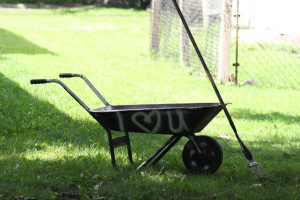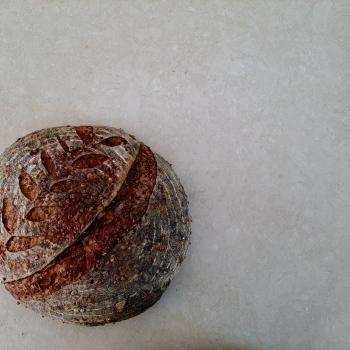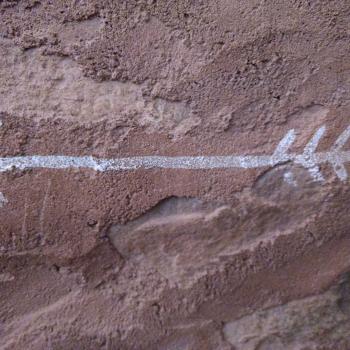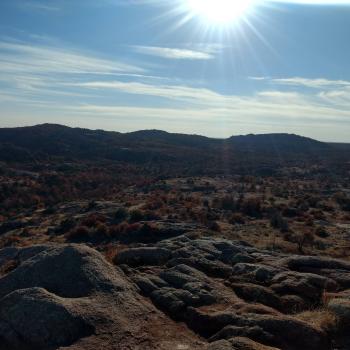
Earth Day is a great time for Christians to show our love for God’s green earth.
Of course, the challenge of loving the earth is knowing which part of the earth to love. There’s so much of it, after all–from continents to calla lilies to cyanobacteria. And while all of it is God’s earth and thus worthy of our care and affection, the asthenosphere doesn’t give me the same kind of warm fuzzies as, say, panda cubs.
So rather than try to wrap our hearts around love for the earth in general, this Earth Day why not start with love for one particular part of it: the soil. Love for the soil may be the most biblical way to approach love for the earth. God placed Adam and Eve in the garden to “tend and care” (Genesis 2:15) for the adamah–“soil” or “earth” (3:23). Humanity’s care for Eden was first and foremost care for the soil.
Undoubtedly, God’s charge to tend and care for the soil had to do with its fragility. Soil is a resource that only slowly renews through the action of fungi and bacteria, insects and earthworms. But more than the soil’s fragility, it’s perhaps the soil’s capacity to bring forth new life that causes God to confer on humankind a special charge to tend and care for it.
The power to bring forth new life is a sacred power partaking of God’s own creative and life-giving character. In the Scriptures, God protects the use of that power. It’s why the Old Testament Law forbids taking the mother and the young from the bird nest (Deuteronomy 22:6), why children are considered a blessing (Psalm 127), the unborn regarded with mysterious reverence (Psalm 139:13-14), and parent honored (Exodus 20:12). Lack of reverence for God’s sacred, life-giving power invested in human bodies is what got Onan in trouble (Genesis 38:9-10).
And love for the soil is also love for people who live and depend on that soil–which is all of us, though high-rises and parking lots may obscure the fact. We are dust, and to dust we shall return (Genesis 3:19). In the meantime, it’s the living dust that feeds and sustains us. Thus, whenever we harm the soil–through toxins, factory farm techniques like CAFO’s (Concentrated Animal Feeding Operations), or lack of attention to erosion, we are harming other people–our neighbors who we are commanded to love.
What concrete actions can Christians take to love the soil? More often than not, we focus on what we shouldn’t do. Don’t pollute. Don’t litter. Don’t deep till. But love for the soil is more than that. There’s no one way to do it. Here are four suggestions for how Christians can love the soil this Earth Day:
- Plant a garden. Get in there and touch, feel, and work the soil. Even if it’s just a planter box on the windowsill with a few rangy chives, get some dirt under your fingernails and make something grow.
- Make some compost. By some estimates, the American food system throws away one-third of all food produced. Most of it ends up in landfills. In our house, we separate organic wastes into chicken-edible and compostable. Anything we or the chickens don’t consume ends up in our compost pile. Together with chicken manure, grass clippings, and leaves, our compost pile decomposes over the course of the year until we’re left with a rich humus, which we then add to our garden soil. That soil in turn produces vegetables, which we eat. When we toss the scraps back into the compost, the nutrient cycle continues.
- Encourage earthworms. As writer Amy Stewart documents in her book, The Earth Moved: On the Remarkable Achievements of Earthworms, earthworms are key to building up healthy soil. Their castings fertilize the soil, and earthworms’ constant traveling through the earth creates channels for aeration and water penetration. Their mucus encourages the growth of beneficial bacteria and fungi. By choosing not to till the soil, we can give earthworms a safe place to thrive. Earthworms also love cover crops, straw mulch, and compost.
- Pray and sing while you care for the soil. Your neighbors might look at you a little funny, but make your soil-work an act of praise by singing a hymn to the Creator. Offer a prayer as you tuck those potatoes into the dirt. Remember that it is God who ultimately sustains the matrix of life that is the soil. God sends forth his Spirit, and “renew[s] the face of the adamah/earth” (Psalm 104:30).
When we treat the soil right, there’s a way in which we’re honoring the God who made and claims it. In the words of the well known psalm, “The earth is the Lord’s and all that is in it” (Psalm 24:1).












